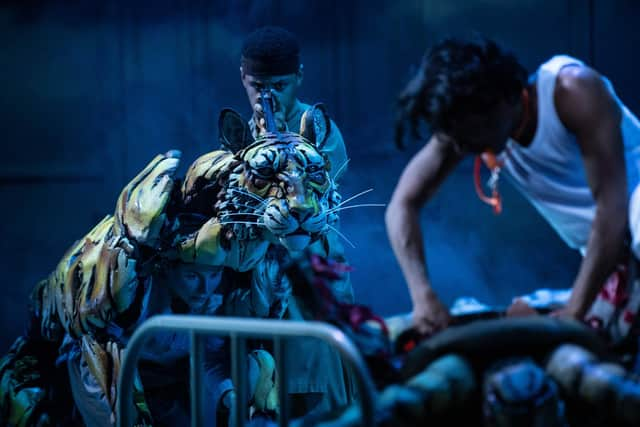Theatre review: Life of Pi, His Majesty's Theatre, Aberdeen
Life of Pi, His Majesty’s Theatre, Aberdeen ****
When Yann Martel’s novel Life Of Pi was first published in 2001, in Martel’s home country of Canada, it won the kind of global acclaim of which most young writers can only dream. Despite a long struggle to find a publisher, the book soon shot to the top of bestseller lists, winning the 2002 Man Booker Prize, and going on to sell more than ten million copies worldwide. In 2012, it became a massively successful film directed by Ang Lee, winning four Oscars; and Lolita Chakrabarti’s stage version, premiered at the Sheffield Crucible in 2019, has also become a global hit, piling up awards in both London and New York.
It’s therefore something of a triumph for Aberdeen Performing Arts to host Max Webster’s acclaimed production at an early stage in its current UK and Irish tour, five months ahead of its summer visits to Glasgow and Edinburgh; and there’s no doubt that this eloquent stage version, featuring a cast of 20 and some tremendous animal puppetry, more than lives up to its high reputation.
Advertisement
Hide AdMartel’s novel famously tells the story of an Indian boy, brought up in and around a zoo in Pondicherry owned by his father, who loves to ponder on philosophy and theology, and embraces all the world’s great faiths on his mission to “love God”; but who finds himself tested to the limit when the ship carrying his family and their animals to a new life in Canada sinks during a storm, leaving him afloat in the Pacific on a lifeboat also populated by some stray zoo animals.
Most of the animals are quickly eaten by the hyena, who is then himself killed and eaten by the zoo’s resident Bengal tiger, known as Richard Parker. The story therefore revolves around Pi’s efforts to avoid being eaten by the tiger and to establish a relationship with him, while somehow surviving 227 days at sea with only 36 days’ supply of food and water; and around his attempts, after he washes up in Mexico, to tell the improbable story of his survival to officials investigating the shipwreck.
In dramatising this dream-like and visionary story, Max Webster’s production relies on three main factors, beyond Chakrabarti’s deft and respectful script, which covers the main points of the story in a brisk two hours plus interval. Tim Hatley’s design, beautifully lit by Tim Lutkin and Tim Deiling with video material by Andrzey Goulding, moves with a wonderful seamless fluency from hospital bed in Mexico, through zoo and shipwreck, to the lifeboat lost in the ocean, and back again; and also captures the full wonder and mystery of life “out here”, under an ocean sky filled with starlight. The puppet animals – goat, zebra, orangutan, hyena, and of course the tiger – are magnificently realised by puppet makers Nick Barnes and Finn Caldwell, with Caldwell also directing the half-dozen brilliant puppeteer- performers who bring the animals to life.
And among a gorgeous and passionate cast, Divesh Subaskaran delivers an outstanding performance as Pi, a boy both naive and all-knowing, intensely vulnerable yet incapable of admitting defeat, and constantly guided by the remembered voices of the elders who come and go in his imagination.


In the end, Life of Pi is a strange story, dedicated to the debatable – and sometimes disempowering – idea that reality itself only a story, constantly shifting as we tell it. In the end, though, the boy Pi is clear that our story is better if it includes God, and if it includes animals who are present in their own right, rather than as metaphors for various types of humanity; and it seems difficult to argue with that, after such a tale of imagination, faith, and the humbling power of the natural and animal world.
His Majesty’s Theatre, Aberdeen until 3 February; Theatre Royal, Glasgow, 18-22 June; Festival Theatre, Edinburgh, 25-29 June.